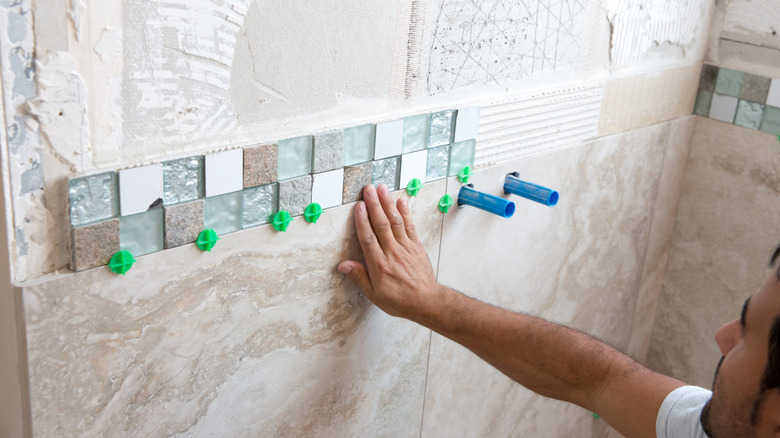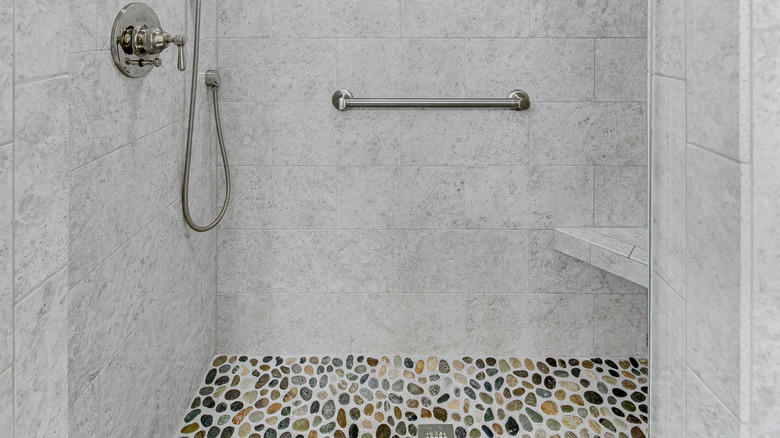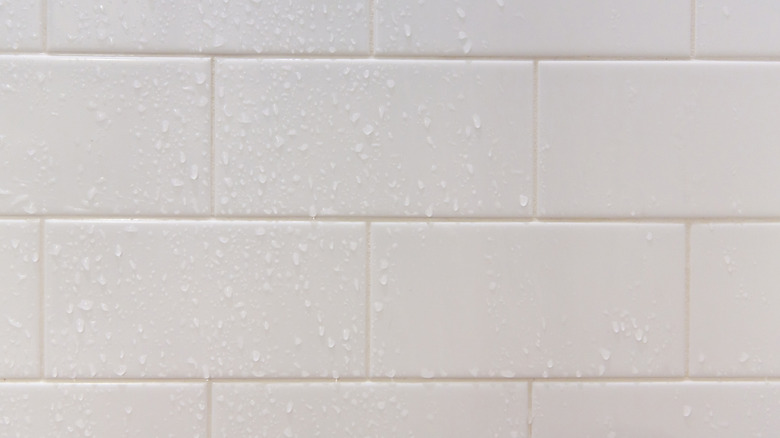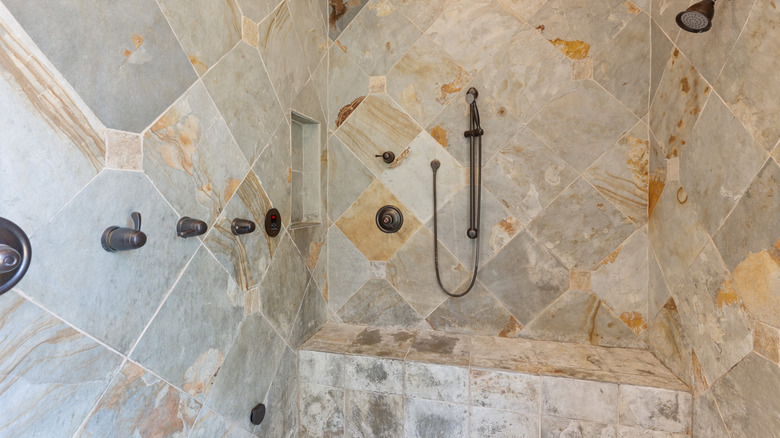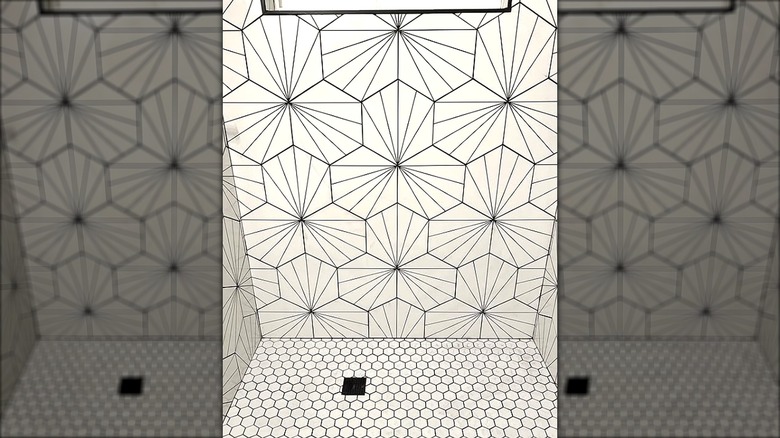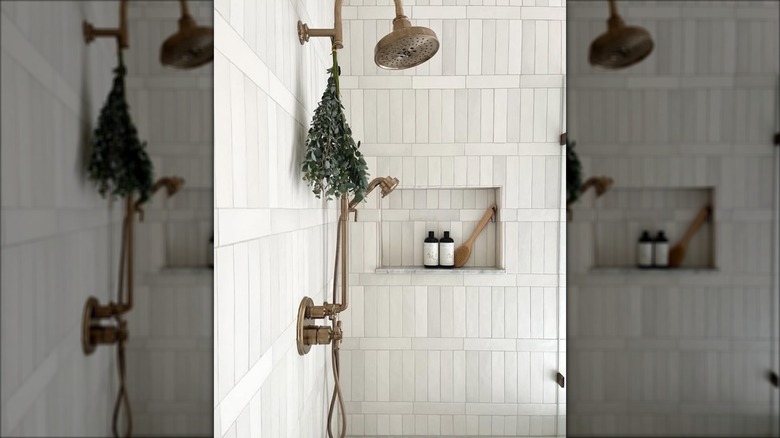The Worst Shower Tile Options To Avoid (And Durable Alternatives To Try Instead)
Whether you're in the process of constructing your new home or finally doing the bathroom remodel of your dreams, selecting shower tile is exciting. However, between choosing your favorite colors, patterns, and materials of tile, it can be a little daunting to narrow down all the options. Before you lock in your selections, keep in mind that not all tile types are suitable for the shower. Some important factors to consider include whether or not the tile material is suitable for wet spaces, how easy it will be to clean, and perhaps most importantly, whether or not your tile floor is going to be slippery.
Just because a certain tile is beautiful and perfectly fits the aesthetic of the rest of your bathroom doesn't mean it belongs in the shower. For example, while glossy tiles can provide a gorgeous accent wall or backsplash in the bathroom, they should not be used on your shower floor as they are incredibly slippery. When it comes to selecting tiles for your shower floor, you should only choose tiles that have a DCOF (scale of how slick a type of tile will be when wet) rating of 0.42 or higher. And while you don't necessarily need to put too much concern into how slippery the tiles on your shower walls will get, you still shouldn't overlook this decision either. Because your shower as a whole is a very moist environment, only certain materials of tile are suitable to be used in the shower, even on the walls. With that said, here are types of tiles you should avoid for your shower, and some more functional alternatives to install instead.
You may want to skip installing a pebble tile shower floor
While it may be true that they will give your shower a beautiful and natural look, you may want to think twice before installing pebble shower floors. A big reason to skip the pebbles is because they can be very difficult to clean. Thanks to their uneven and uniquely shaped nature that we love, the grout between the tiles can be hard to reach, and it's easy for dirt, body oils, soaps and other types of grime to build up between the rocks. And, unless the flooring is installed expertly, it can be difficult to ensure that it has proper drainage, as the unique shapes between the pebbles makes it difficult for water to flow to the drain. To make matters even worse, all that built-up dirt and grime can become a perfect habitat for mold, which is one of the last things you want in your bathroom.
Showers with pebble floors will encounter additional issues in homes that have hard water. Hard water can be very damaging to natural stones like pebble flooring, and might alter the color of your floors. The last thing you want is to spend time and money installing a beautiful floor that you love, only to have it ruined by the minerals in your water. You should also consider that although they may be beautiful, the rocky, uneven surface of pebble shower flooring may be uncomfortable to stand on, and it would be better to save the pebble tile in your bathroom for an area you won't have your feet on.
Consider avoiding glossy tiles on your shower floor and walls
While glossy tiles may look beautiful, reflect the light, make your bathroom feel more spacious, and are very easy to clean, they're still a shower and bathroom floor material to avoid. The primary reason you shouldn't use glossy tiles on your shower floor is that they are very slick when wet, which can cause a huge safety hazard in your bathroom. To play it safe, you really shouldn't use any types of glazed tile on your shower floor and instead opt for a tile that has more traction.
Safety isn't the only reason you should pass on glossy tiles for your shower floor. While one of the best features of glossy tiles is that they reflect the light, that's not the only thing they highlight. When glossy tiles are dirty, it's glaringly obvious. The reflective nature of the tile will put smudges, dirty spots, finger and footprints, soap scum, and pretty much any other imperfection on full display. Unless you're very meticulous with your cleaning, glossy tiles are likely going to make your shower and tub appear dirtier than other tiles might.
This is also a reason to skip using glossy tiles for your shower walls. Even though it doesn't matter if your shower walls are slick for safety, glossy tiles can still make them look dirty by reflecting all the watermarks, fingerprints, and smudges. If you're not keen on taking a squeegee to your walls after every shower to keep them sparkling, this tile type is probably not for you.
Natural stone tile is best left out of the shower
If you're trying to transform your shower into an earthy oasis, it's possible you're considering natural stone tiles. Marble, granite, travertine, and limestone are just a few popular natural tile options. Before you use these tiles in your bathroom, it's important to know that these stones are naturally porous, which means they have small crevices that liquid can seep into over time. Moisture penetrating your tiles will not only cause damage and potential stains, but it can also cause them to mold, which can potentially lead to health problems.
One way to combat this issue is to make sure that the natural stone is properly sealed to keep out moisture. However, in a particularly damp environment like a shower, it may be necessary to reseal the stone as frequently as every four to six months. On top of needing to spend money on products to either seal the stone yourself or pay a professional, this is also very time consuming, as the sealant will need to dry for 24-48 hours each time. For homes with one bathroom, this is probably completely unrealistic, and even if you have multiple, who wants to have the shower out of commission multiple times a year?
Even if you do take the proper steps to seal natural stone in your shower, it's still going to be susceptible to damage from etching. Etching is the process of acids eating away at the stones over time. This can be an issue in the shower if you use any acidic cleaning products or soaps, or if your home has hard water.
Porcelain mosaic tiles are a more durable shower floor alternative
If you don't want to deal with slippery shower floors that can be easily damaged, a better option is to install porcelain mosaic tiles on your shower floor. Because mosaic tiles are so small, they have plenty of grout lines that will give you sufficient traction so you're not slipping and sliding while you're trying to shower. Plus, mosaic tiles made from porcelain are going to be far less convex than pebble tiles, which should be more comfortable to stand on.
Ceramic and porcelain are regarded as the best shower tiles to use in your bathroom because they are both incredibly durable, easy to clean, and, most importantly, resistant to water. Porcelain is very dense and almost completely resistant to absorbing water, making it the superior choice for an area like the shower floor that is going to be consistently getting wet. Additionally, because porcelain has such a low level of porosity, it is very easy to keep clean and maintain. One thing to keep in mind when considering porcelain shower floors is that the durability of the material also makes it a difficult tile to cut, which means it will be slightly pricier than other options. With that said, it will also last a long time, so you can rest assured it's a sound investment. Just be sure to choose a porcelain mosaic tile with a matte finish rather than a glossy one so your shower floors aren't slippery.
Ceramic tiles are great for shower walls
When it comes to your shower walls, both porcelain and ceramic tiles are good options. If you're deciding between the two, though, ceramic tiles may be the better choice for shower walls if you're on a budget. While ceramic tiles are considered water resistant, they're not waterproof, and they're certainly not as water resistant as porcelain tiles, especially when it comes to water sitting and pooling up on them. Because of this, it's better not to use ceramic tiles for your shower floor. However, since pooling water won't be an issue here like it would be for the floor, ceramic tiles are a great option for your shower walls. Plus, ceramic tile is incredibly durable, and it's a very affordable tile option.
Ceramic tile is also much easier to work with, which is good news if you're trying to DIY your shower remodel. Not to mention with a lower price point than porcelain, ceramic tile is an attractive choice for shower walls, as you'll most likely use a lot more material tiling your walls than you would your floor — depending on the shape of your shower of course. There are also a plethora of options for different colors, shapes, and textures of ceramic tiles, so you can easily plan out the shower aesthetic of your dreams.
